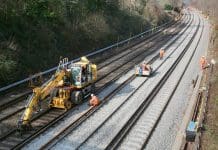What does the HS2 cancellation mean for land already purchased? Gowling head of planning Vicky Fowler and principal associate Rachel Martin explain the rules governing compulsory purchases and what happens next
With the HS2 cancellation of the Birmingham to Manchester leg, HS2 Limited is left with hundreds of properties it had purchased in readiness for the works.
With tales of disgruntled and angry former landowners abounding in the press and the minister for transport explaining that the government would look to recoup at least some of the £423m spent by selling off the property and land, what does it mean for these former land and property owners?
The Prime Minister’s announcement at the recent Conservative Party conference brought days of speculation about the future of the Birmingham to Manchester line to an end.
HS2 has overshadowed land development near the proposed route for more than a decade. With the HS2 cancellation, new development options will arise for the safeguarded land, but the disposal of HS2’s properties along the route will not be a simple process.
It may, therefore, be many months or even years before the ‘for sale’ signs go up.
What are the Crichel Down Rules?
Firstly, let’s discuss the Crichel Down Rules, which govern the disposal of government assets purchased compulsorily (or by agreement on the threat of compulsion) and subsequently become surplus to requirements.
Although non-statutory, they apply widely to public bodies that hold compulsory purchase powers and are considered mandatory for all government departments and non-departmental public bodies in England.
HS2 Limited is a non-departmental public body sponsored by the Department for Transport, so the rules will now be engaged as it seeks to dispose of properties along the cancelled route.
The rules take their name from Crichel Down, which was compulsorily acquired in 1938 by the Air Ministry. The principle they enshrine originates from a promise made by Winston Churchill in 1941 that land acquired for the war effort would be returned to its owners when it was no longer required for the purpose for which it was bought.
When, at the end of the war, rather than being returned, Crichel Down was handed over to the Ministry of Agriculture, the former owner’s daughter launched a campaign for Churchill’s promise to be kept.
Amid significant political fallout, Crichel Down was returned to its former owners in the 1950s, and the principle that land acquired compulsorily should, when no longer required for the purpose that it was taken, be returned to its former owner was set out in the Crichel Down Rules. The rules have governed government disposals ever since and are a fundamental pillar of compulsory purchase practice in England.
Compulsory acquisition is only allowed when the balance between the private rights of the landowner and the public benefit tips towards the public benefit. If that balance changes because the public benefit falls away, it is right that the landowner should be able to recover his property.
How do the Crichel Down Rules apply to the HS2 cancellation?
So what can former owners along the cancelled HS2 route expect? Regardless of whether their property was acquired compulsorily or by agreement, or indeed whether it was acquired as a result of blight, they should be allowed to repurchase their property at today’s market value.
Only if the former owner declines this offer will HS2 Limited be able to dispose of these properties on the open market. HS2 Limited must trace former owners, obtain valuations, and make resale offers.
Compliance with the Crichel Down Rules will add practical complexities that will impact the costs of the HS2 cancellation.
The repurchase price will not simply equate to the compensation paid out to landowners on acquisition. Values may have changed simply through movements in the market or as a result of preliminary works or the deterioration of properties left empty.
Moreover, for most properties, the compensation will have exceeded the value of the land. Sums paid to landowners to cover disturbance, severance or occupier’s loss can’t be added to the repurchase price.
Compulsory purchase orders, a change in approach?
Compulsory purchase orders allow certain bodies to acquire land without the owner’s consent. With the fallout from the cancellation of the Birmingham to Manchester leg of HS2, some are now arguing that there should be changes to the current approach of using compulsory purchase orders for infrastructure.
However, some tests can help determine whether compulsory purchase powers regarding national infrastructure should be confirmed or granted.
These include whether the applicant has a clear idea of how they intend to use the land it is proposed to acquire, whether the compulsory acquisition is proportionate and whether there is a reasonable prospect of the requisite funds for acquisition becoming available.
In the case of HS2 Phase 1, all of those tests could be ticked, including where land has been acquired for later phases that would have been voluntary or through the property schemes.
Yet, one cannot legislate for the government to withdraw backing, and the decision to grant powers can only be taken on the facts at the time. Therefore, it is extremely unlikely that there will be a change to the current approach.
Vicky Fowler
Head of planning
Rachel Martin
Principal associate
Gowling











![[VIDEO]: HS2 contractors carry out M42 bridge demolition in timelapse footage of 52 hours Solihull-based firm Armac removed a 4,000 tonne bridge over the M42- and carried out the demolition ahead of schedule](https://www.pbctoday.co.uk/news/wp-content/uploads/2024/02/HS2-contractor-Armac-demolishes-M42-bridge-2_cropped-218x150.jpg)





